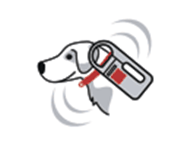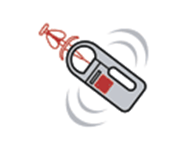¿Porque identificar animales?
Darle una identificación electrónica individual a cada mascota es como darle su propio pasaporte. Los transpondedores de RFID, tan pequeños como un grano de arroz, pueden implantarse bajo la piel de la mayoría de mascotas para ofrecer una identificación permanente y mejorar las probabilidades de que los animales perdidos sean regresados a sus verdaderos dueños. Una vez implantados, los chips de RFID pueden usarse convenientemente para administrar los registros médicos de la mascota, así como su historial médico.
La identificación electrónica de mascotas se introdujo en algunas regiones europeas a inicios de los 90 y pronto, veterinarios, criadores, los kennel club y otras instituciones empezaron a ver los beneficios de esta nueva tecnología. Hoy en día, el microchip está considerado como el modo más confiable y eficiente de identificación y reunificación de mascotas, y los gobiernos y organizaciones de salud animal en todo el mundo han promulgado leyes para hacer obligatorio el uso de identificación electrónica en mascotas.
Ejemplos de países en donde es obligatoria la identificación electrónica:
- Identificación de perros y gatos con tecnología de RFID obligatoria en Israel (desde 2005) y Japón (desde 2004).
- Identificación de perros y gatos con tecnología de RFID obligatoria en algunas regiones de Polonia (desde 1998), Serbia (desde 2006), Eslovenia y España (desde 1990) y Suiza (desde 1994; desde 2007 en todo el país).
- Identificación de caballos con tecnología de RFID obligatoria en Bélgica (desde 2002), Dinamarca (desde 2001) y Holanda (desde 2001).
Los Lectores
El lector es el aparato que permite acceder a la numeración del microchip. Dependiendo el modelo, además se puede adicionar información extra, que queda almacenada en el mismo lector. Estos datos pueden ser el nro de caravana, categoría, estado reproductivo, etc., pudiendo enviar esa información inmediatamente vía bluetooth o luego descargarla en la PC.
Identificación en Mascotas
Puede utilizarse, entre otras aplicaciones, para:
* Reencontrarse el dueño con su mascota perdida.
* Garantizar la tenencia responsable.
* Regularizar y controlar sanitariamente la población en un municipio o departamento.
* Comprobar la identidad del asegurado en medicina prepaga u hospital veterinario.
* Facilitar el registro de historias clínicas de los profesionales veterinarios.
Identificación en Crías especiales
Cría de especies exóticas y/o especiales, zoológicos, reservas faunísticas y demás establecimientos pueden identificar sus animales con los productos Datamars.
Se pueden obtener los siguientes beneficios, entre otros:
* Seguimiento de la población.
* Control sanitario.
* Control reproductivo.
* Registros confiables.
* Evitar robos y fraudes.
Importante: La aplicación del microchip es una tarea que debe realizar un veterinario.

Verifique que el animal no posee algún transpondedor (chip) previo

Controle el correcto funcionamiento
del transpondedor (chip)

Implante el transpondedor y luego
lea el mismo con el Lector.
